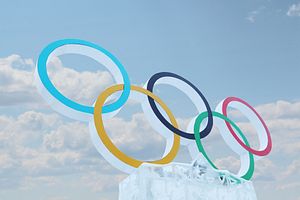Lausanne, Switzerland isn’t just a destination for nuclear talks. This week the alpine city hosted delegations from Kazakhstan and China, which presented their candidate city briefings to members of the International Olympic Committee in hopes of securing the 2022 Winter Olympics. The two cities remaining — Almaty and Beijing — will have one more chance to impress the International Olympic Committee when it votes at the 128th IOC Session, to be held from July 31 to August 3 in Kuala Lumpur, Malaysia.
Last week the IOC released a report from the Evaluation Commission for the 2022 games. The report is the first after the unanimous approval of the 2020 Olympic Agenda, which included a number of landmark reforms.
The reforms reworded one of the “Fundamental Principles of Olympism” to expand its non-discrimination clause to include sexual orientation. This reform seems to have made an impact in Kazakhstan. In February, both houses of the Kazakh parliament passed an anti-gay propaganda law similar to the Russian law, which sparked the movement to reform the Olympic principles. In late May the law was struck down by Kazakhstan’s constitutional court as “vague.”
Other reforms mandated by the 2020 IOC agenda, and even some that occurred before the full agenda was voted on in December 2014, may not see such immediately tangible results. For example, an October 2014 decision by the IOC required host countries to sign a contract agreeing to protect human and labor rights, as well as the environment. While the recently released IOC report touches on these subjects, it relies heavily on government assurances.
The IOC report says that it considered statements from third-party reports — from Human Rights Watch, the Committee to Protect Journalists, and the International Trade Union Confederation — “with regard to environmental protection, the treatment of detainees, media freedom, Internet access, the right to demonstrate, and the integrity of the judicial and electoral systems.” The IOC report does not name or link to these reports, but a January essay in Human Rights Watch’s World Report by Minky Worden espouses a number of concerns with regard to “mega-sporting events.” Worden wrote that the “outlook for the 2022 Winter Olympics — with Kazakhstan and China as the only contenders — should be keeping the IOC up at night.” Worden continued:
Both countries have abysmal press freedom records and journalists languishing in jail. Beijing has launched its harshest crackdown since the 1989 protests in Tiananmen Square that ended in bloodshed, is jailing journalists, and is breaking an international agreement to allow free elections in Hong Kong. In Almaty, where peaceful dissenters are routinely imprisoned and labor rights often flouted, the IOC could experience a disastrous déjà vu of the Sochi clampdown and abuses.
Still, the IOC seems content with assurances from China and Kazakhstan that the internet will be unrestricted, protesters permitted, laborers compensated adequately, and people not unduly displaced.
On an environmental front, the 2022 Games may not fit into the 2020 agenda’s vision to include sustainability in all aspects of the Games. The report does note that two of the three locations near Beijing pegged to host sporting events — the Yanqing Zone and the Zhangjiakou Zone — “have minimal annual snowfall and for the Games would rely completely on artificial snow.” Images in the report, taken in January 2015, feature snowless mountains with lines labeling ski courses and comments that “Northern China suffers from severe water stress and the Beijing – Zhangjiakou area is becoming increasingly arid.” The report notes that the “reliance on artificial snowmaking would require diversion of water from existing reservoirs” which may negatively impact the surrounding ecosystem.
While Beijing is often called the front-runner, these issues may undercut its chances. Almaty, for its part, is also critiqued in the report for its poor air quality but the location proposed “would be developed on unused agricultural land in the northeast part of Almaty and does not appear to present environmental risks.”
“I think the Almaty presentation scored some points,” U.S. Olympic Committee chairman and IOC member Larry Probst told the AP. “They drove home the message ‘keeping it real.’ That was all about snow versus making snow. I think that resonates.”

































